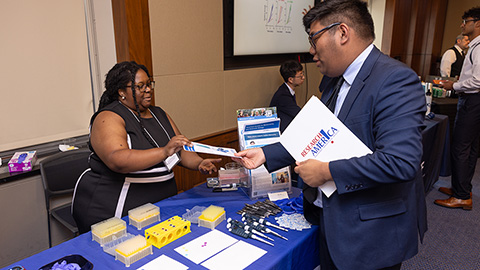Your voice does matter
In June, the Public Affairs Advisory Committee urged all members of the American Society for Biochemistry and Molecular Biology to contact their congressional representatives about three pieces of legislation that would broaden participation of underrepresented groups in STEM.
These bills direct federal agencies to increase opportunities for underrepresented minorities, women and veterans pursuing degrees in science, technology, engineering and mathematics. They improve transparency and accountability of existing programs that aim to broaden STEM participation. While this sounds bureaucratic, increased transparency is necessary to evaluate and improve these programs and ensure they are an effective use of taxpayer dollars.
All told, ASBMB members sent almost 800 messages to members of Congress in support of the legislation. You educated your representatives on the issue, and two of the three bills gained nearly a dozen additional co-sponsors from seven states.
Eight hundred is an impressive number, but with some 10,000 ASBMB members, we had hoped for more.
Politics in America today can leave anyone feeling exhausted. A deep partisan divide and bitter political discourse might make you think advocacy is a waste of time.
I understand why you’d feel that way.
Issues such as tax cuts, abortion rights and immigration are now so deeply partisan that your lawmakers’ stance seems predetermined by whether there is a “D” or an “R” next to their names. They seem to have no flexibility to consider an alternate view. This can make you question the value of those advocacy campaigns that ask you to “click here to send a letter to your representative.”
All is not lost, however, if you back away from hot-button topics and focus on less risky and divisive issues that are vital to the scientific community, such as investments in research, STEM education policies and legislation focused on improving and diversifying the scientific workforce. On these topics, you — as a subject matter expert — can have an effect and nurture support by educating your member of Congress.
Grassroots advocacy does work. A 2017 report by the Congressional Management Foundation found that direct constituent interactions have more influence on lawmakers’ decisions than other advocacy strategies. The report stated that citizen advocates “are more influential and contribute to better public policy when they provide personalized and local information to Congress.”
Emily Hulobowich, executive director of the nonprofit Coalition for Health Funding, agrees. “There’s an old saying in Washington: If you’re not at the table, you’re on the menu,” she told me. “Lawmakers must hear directly from those they care the most about — their constituents — about their priorities and concerns to move issues forward. If constituents aren’t willing to speak loudly and often, it’s unlikely their priorities and concerns will rise to the top of the agenda.”
We want to engage more ASBMB members in future advocacy campaigns. We know you’re busy going to class, conducting research, teaching and applying for grants. We know your time is valuable, and this may not be a top priority for you.
But if you didn’t get involved this time because you think it won’t make a difference or you believe your representatives won’t listen, we want you to know that they hear you; we saw that with the added co-sponsors following our spring campaign. Advocacy works, and representatives are listening. Don’t assume others will deliver the message for you. Make sure your voice is heard.
Enjoy reading ASBMB Today?
Become a member to receive the print edition four times a year and the digital edition monthly.
Learn moreGet the latest from ASBMB Today
Enter your email address, and we’ll send you a weekly email with recent articles, interviews and more.
Latest in Policy
Policy highlights or most popular articles

Embrace your neurodivergence and flourish in college
This guide offers practical advice on setting yourself up for success — learn how to leverage campus resources, work with professors and embrace your strengths.

ASBMB honors Lawrence Tabak with public service award
He will deliver prerecorded remarks at the 2025 ASBMB Annual Meeting in Chicago.

Summer internships in an unpredictable funding environment
With the National Institutes of Health and other institutions canceling summer programs, many students are left scrambling for alternatives. If your program has been canceled or delayed, consider applying for other opportunities or taking a course.

Black excellence in biotech: Shaping the future of an industry
This Black History Month, we highlight the impact of DEI initiatives, trailblazing scientists and industry leaders working to create a more inclusive and scientific community. Discover how you can be part of the movement.

ASBMB releases statement on sustaining U.S. scientific leadership
The society encourages the executive and legislative branches of the U.S. government to continue their support of the nation’s leadership in science.

ASBMB and advocacy: What we accomplished in 2024
PAAC members met with policymakers to advocate for basic scientific research, connected some fellow members with funding opportunities and trained others to advocate for science.

